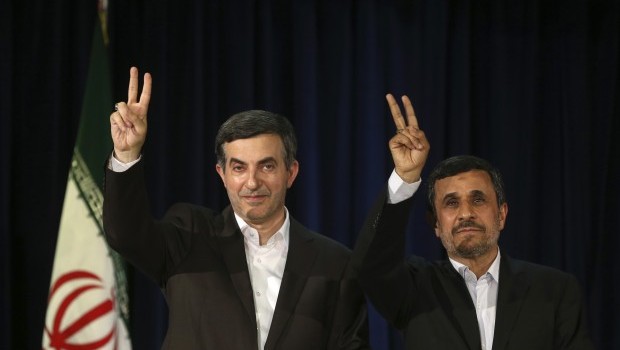
Iranian President Mahmoud Ahmadinejad, right, and his close ally Esfandiar Rahim Mashaei, flash victory signs at the start of their press conference, after registering candidacy of Rahim Mashaei for the upcoming presidential election, at the election headquarters of the interior ministry, in Tehran, Iran, Saturday, May 11, 2013. Source: AP Photo/Ebrahim Noroozi
The text of the letter and the full list of the names of its signatories have yet to be published, although one MP, E’vaz Heydar-Pur, has described the letter as being addressed to Ayatollah Amoli Larijani, head of the judiciary, so a criminal indictment against the president can be prepared. In contrast, another MP, Mansour Haghighat-Pur, said the letter was intended for the Guardian Council, and complained about the president’s direct endorsement of a candidate, as well as providing evidence that would disqualify Mashaei from the race.
Ahmadinejad’s endorsement of Mashaei was made plain on Saturday, when he told reporters that “Ahmadinejad means Mashaei, and Mashaei means Ahmadinejad” during the registration procedure at the Interior Ministry.
According to Iranian law, the serving president cannot endorse or campaign for a political candidate. A spokesman for the Guardian Council, which vets political candidates, said that the council had met and decided that President Ahmadinejad’s actions on Saturday were a breach of the law. However, it is up to the judicial authorities to pursue any case.
Elsewhere, the rifts between Iran’s conservatives were on show, as members of the principalist faction opposed to Ahmadinejad warned that he would seek to retaliate if Mashaei is rejected by the Guardian Council.
Mojtaba Zol-Nur, a hardline conservative cleric and the former deputy of the supreme leader’s representative to the Revolutionary Guard Corps, warned of the possibility of a “frantic reaction of Ahmadinejad in case of Mashaei’s disqualification by the Guardian Council,” according to the FARS news agency.
“Ahmadinejad’s behavior is complicated—thus far unpredictable. He may sack a number of cabinet ministers to revoke the government or even decide to resign,” he added.
Iran’s higher education and technology minister, Kamran Daneshjoo, justified Ahmadinejad’s gesture, and said that his support for Mashaei was “the president’s own private attitude, not the government’s opinion.”
The last-minute registration of both Ali Akbar Hashemi Rafsanjani and Mashaei seems to have disrupted the plans of the principalist faction for the upcoming election on June 14. Naser Imani, a principalist writer, argues that Hashemi Rafsanjani’s entry to the race has totally changed the landscape of election in terms of the cost-benefit calculation of disqualifying Rahim Mashaei.
According to Imani, without Hashemi Rafsanjani as a candidate, the cost of disqualifying Mashaei could have been very high due to the absolute support that Ahmadinejad would be ready to give him. But now, with Hashemi Rafsanjani in the running, the conservative Guardian Council faces a dilemma in deselecting Mashaei, as this runs the risk of his supporters transferring their votes to the former—and perhaps future—president.
Many principalist commentators suggest that Hashemi Rafsanjani and Mashaei’s candidacies are evidence of a secret pact. Hamid Reza Taraghi, a member of the traditionally conservative Mo’talefeh Party, said that “there is hidden agreement between Hashemi Rafsanjani and Rahim Mashaei” in an interview with Fara-Ru website. He argues that “Ahmadinejad and his team welcome Hashemi Rafsanjani’s presence so they can be benefit from his involvement in the election.”
Despite the controversy surrounding the entrance of the two men into the race, one thing is clear even at this early stage: The by-product of both Hashemi Rafsanjani and Mashaei applying to take part in the election is that both will remain active in politics in Iran, even if neither of them becomes president.
